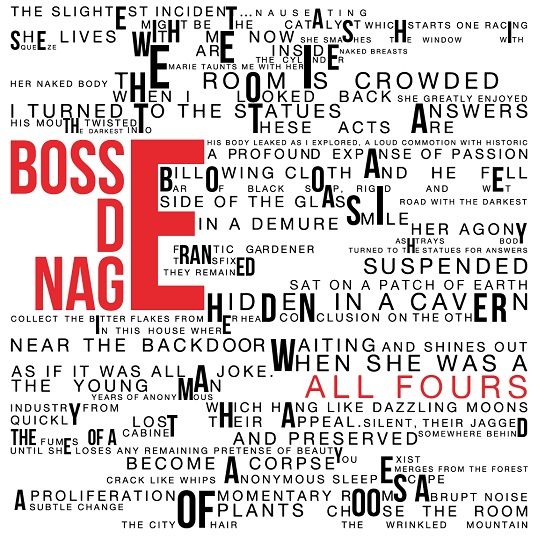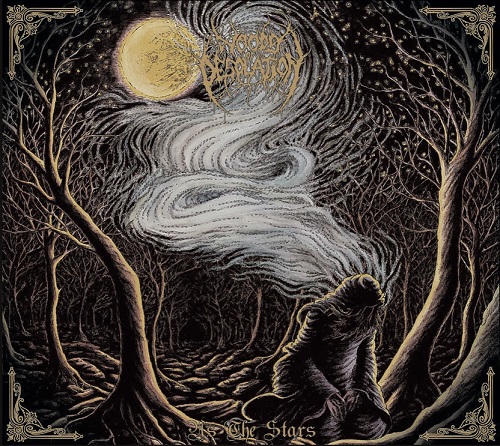
Bosse-de-Nage (pronounced something like “Boss De Nazh”) are a four-piece band from San Francisco. They pumped out their first three albums in a span of three years, between 2010 and 2012, and then took their time getting this one together while cultivating a friendship with Deafheaven that lead to a split 12″ and some enhanced name recognition. All Fours was just released via Profound Lore Records last week, and any serious student of extreme music owes it to themselves to check it out. Just when I thought nothing in 2015 could be more stylistically unorthodox than Liturgy’s The Ark Work (ok, that claim probably still stands), Bosse-de-Nage turn up with an album that’s going to leave me scratching my head for a long time to come. What’s so interesting about All Fours is that you can walk away with a totally different impression of what the band is doing depending on your personal musical background.
Track: At Night
The album kicks off in post-metal mode, ebbing and flowing through a brooding, pessimistic mire beneath Bryan Manning’s desperate screams. Two minutes and change in, the song transitions to the sort of pounding fuzz that might call to mind Converge’s “Jane Doe”. As things continue to change, you get the feeling that it’s progressing towards an ever more desperate state. Black metal seems to play a major role in that intensification, with earlier passages reappearing in a more tightly packed onslaught of notes. The ending, for instance, revisits that Jane Doe sound, but the once cymbal-centric drumming is now competing with blast beats. “At Night” is a song in constant flux, and it could have been an erratic mess, but instead it’s strikingly fluid. Bosse-de-Nage manage to keep a thread of accelerating emotions taut throughout the long chain of ideas and influences that comprise it.
The next song, “The Industry of Distance”, sends a similar message. A simple, clean guitar lick repeats over bassy feedback for the better part of two minutes. Drums sneak up into a slow roll to cue distorted drawling guitar chords, and soon the song explodes in one of those beautiful melancholy post-black metal anthems we’ve been growing accustomed to. Instead of lightning quick tremolo and blast beats though, the drum and guitar initially seem to execute at half the frequency while Manning screams in his uniquely heartbroken style. It creates a sort of oscillating effect for an ear expecting black metal, every other note appearing to be missing. This eventually fills out into full speed tremolo and blast beats to complete another build-up through higher stages of emotional breakdown.
That’s my general metal take on All Fours. While a lot of what we’re calling post-black metal today diverges melodically from the genre’s origin, Bosse-de-Nage go further in exploring the techniques that characterize it. The drumming especially diversifies the package. Tremolo guitar and blast beats signify climaxes in a post-metal progression rather than perpetual constants, and a lot of care is given to make the development taking us there feel natural and captivating. Instead of the instant gratification of say, Liturgy or Krallice, Bosse-de-Nage effectively tap that post-rock tradition of “building up” to it.
Track: Washerwoman
That is probably a more accurate approach to understanding this album, because the band is firmly rooted in black metal. Manning at least has stated that he’s never heard of a lot of the other bands Bosse-de-Nage has been compared to lately. But the more this band diverges in technique from black metal, the more they find themselves labeled screamo and post-hardcore. If you’re familiar with that world of music, it’s a pretty fascinating truth. When bands play with the framework of a classic style, the boundaries of genre dissolve. Yes, “Washerwoman” could easily pass as a post-metal/black metal hybrid. Around the two minute mark it begins to sound strikingly similar to Isis. When the song breaks at four, they could be toying with black metal guitar by letting some of the notes ring out–a precursor to the proper bm onslaught that comes at five. But is that what you hear? Or do you hear a song straight off A Dead Sinking Story by Envy, peppered with spoken lines a la Indian Summer? It depends on where you’re coming from.
Envy-worship is actually how my brain interpreted “Washerwoman” on first listen, and I made immediate associations with other screamo acts throughout the album. I am not alone here. In the early reviews I’ve found so far, this album has been compared to Orchid, City of Caterpillar, Heroin, Moss Icon… Almost every track on All Fours feels extremely influenced by screamo. But it is not. It’s the same sort of thing that happened with Neige on Le Secret and Souvenirs d’un autre monde, when the pioneer of “shoegaze black metal” came out that he didn’t have a damn clue what “shoegaze” was.
I first mentioned screamo and black metal in the same sentence when Drudkh released Microcosmos (2009). “Ars Poetica”‘s climax screamed Orchid and The Kodan Armada and a half dozen other names to me as it slid up and down the neck with drum accents to punch it home, introduced by that classic clean guitar over tense, snare-centric drumming. Deafheaven’s Roads to Judah (2011) resurrected the idea, and Portals to a Better, Dead World (2013) by Cara Neir ultimately sealed it, making black metal screamo crossovers a certain reality. But was there any actual direct influence in any of these cases?
I used to think there was, and I know that Liturgy at least has a post-hardcore background, but any of these bands might have landed on their sounds totally independently. All Fours really sends that message home to me. It’s a window into natural affinities between genres. When Bosse-de-Nage break down the components of black metal into longer, more ringing tones while maintaining that post-bm sense of desperation, they are essentially playing screamo, and the way they seamlessly fuse it back into black metal instrumentation uniquely highlights the similarity. They’re playing post-black metal by definition, but in their approach the two styles are totally indistinguishable save through the cultures surrounding them. When a band can give me a new perspective on an entire genre of music, hey, that’s pretty cool.
Track: The Most Modern Staircase
Of All Four‘s seven proper songs, I am sold on all but “In a Yard Somewhere”. Each builds its way through catchy melodies and interesting stylistic digressions to a convincing emotional climax, and they do it differently from what I have heard before. That it is unique is obvious by the fact that so many people are tossing around band names from way outside of the box in an effort to define it. But there is one other hidden gem in Bosse-de-Nage that stands them apart from the crowd: the lyrics. Bryan Manning has an impeccable flare for the grotesque. From facepalm punchlines about poop and hookers, to really disturbing tales of insanity, to poems that make no discernible sense whatsoever yet pretend to hide some esoteric truth, nearly everything he writes is a ride in itself, independent from the music. Their previous album, III, defies any attempt I could make to describe it, and you should really just go read it all right now. Whether he’s meditatively contemplating a contortionist entering a box or explaining why turning yourself into a human tree was a bad idea, the wording is totally surreal.
The lyrics on All Fours are a little more difficult to decipher, because the stylized sleeve included with the album, for all its artistic appeal, is kind of hard to read. You lose focus trying to dig through it. But The Most Modern Staircase struck me most when I first skimmed over them, and knowing what he’s screaming (not the sort of emo laments his tone of voice might suggest) really enhances the music for me:
I traveled to the province of staircases. The great variety of balusters, railings, finials, and steps filled me with awe. Many looked welcoming, while others were intentionally obscured or blocked up, and some were decorated with vibrant warnings to anyone who might ascend. I found the most modern-looking staircase and climbed. After a while, I stopped on a landing to rest. This extraordinary landing was home to dozens of living statues–obsequious stone gods begging for spare hands. As I explored, a loud commotion with historic consequences occurred somewhere behind me. When I looked back, there was a curtain drawn around the event. I turned to the statues for answers, but they remained inert and silent, their jagged stumps eager for relief.
All Fours: another formidable stalwart in a year that’s been crammed with way more stellar releases than normal. Pick up a copy on Profound Lore Records.


